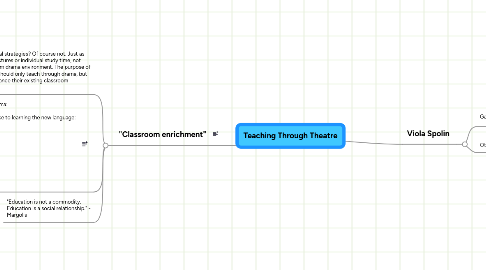Teaching Through Theatre
作者:Brent Samuel


1. "Classroom enrichment"
1.1. "Is drama an end all cure to educational strategies? Of course not. Just as not every student responds well to lectures or individual study time, not every student works well in a classroom drama environment. The purpose of this site is not to claim that teachers should only teach through drama, but rather incoporate aspects of it to enhance their existing classroom environment." (Richard Fairchild, )
1.1.1. Drama should not be considered as a stand alone educational strategy, but rather it should be used to enhance what is going on in the classroom."
1.1.2. I don't agree with this. Perhaps drama should be considered a stand alone cure to educational strategies. Why can't EVERYTHING be taught through drama?
1.1.2.1. What is teaching through drama?
1.1.3. Christina's class play took the place of the classroom for several weeks. She was only engaged in drama for that time and normal classroom activities stopped, however her learning did not stop and she learnt in ways she would not have been able to within a classroom setting.
1.2. Writers such as Maley and Duff, (1978) and Wessels, (1987) have pointed to the values and uses of drama: 'Drama can help the teacher to achieve 'reality' in several ways. It can overcome the students' resistance to learning the new language: -by making the learning of the new language an enjoyable experience -by setting realistic targets for the students to aim for -by creative 'slowing down' of real experience -by linking the language-learning experience with the student's own experience of life And drama can create in students a need to learn the language: by the use of 'creative tension' (situations requiring urgent solutions); by putting more responsibility on the learner, as opposed to the teacher.' (Wessel: 53-54)
1.3. "Education is not a commodity. Education is a social relationship." - Margolis
2. Viola Spolin
2.1. Game based improvisations
2.2. Other forms
2.2.1. Narrative based
2.2.1.1. Keith Johnstone
2.2.2. "The Harrold"
2.2.2.1. The Committee
